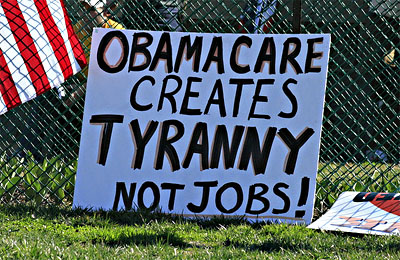Stuart Butler is probably the country’s single most influential right-wing health care wonk. He opposed Obamacare and has long pushed a different, more conservative vision of national health care policy. But Joshua Green writes today that  even Butler is worried about what will happen if the Supreme Court abolishes Obamacare subsidies in the 34 states that don’t run their own exchanges:
even Butler is worried about what will happen if the Supreme Court abolishes Obamacare subsidies in the 34 states that don’t run their own exchanges:
Butler’s worry is grounded in an understanding that voters with skyrocketing premiums may not blame Obama, as Republicans assume. They’ll expect the party hellbent on destroying the law to have a solution—and react badly if none is forthcoming. Because 16 states operate their own exchanges and therefore won’t be affected by the court’s ruling, Butler believes the ACA will stagger on and eventually recover, since voters won’t abide a system wherein some states have affordable, federally subsidized health-care coverage and others do not….“People who believe the ACA instantly goes away are deluding themselves,” he says. “By not doing anything to develop a Republican vision of how to move forward, they could end up with the very nightmare they’re trying to avoid.”
….On the business front, the effects would be no less significant….Entire segments of the health system redesigned their business models to take advantage of the ACA’s incentives. Hospitals, for instance, were given a trade-off: They stopped receiving government payments to offset the cost of treating the uninsured, cuts that amount to $269 billion over a decade. In return, they were promised millions of new patients insured through federal subsidies. “All the major hospital systems and big insurers like Kaiser and Geisinger spent a ton of money adapting to the ACA,” says Butler. If subsidies vanish, “suddenly the market is misaligned. If you’ve hired all these new doctors and health-care workers to cover all these new people walking in the door, and they don’t come, what do you do? You lay them off.”
I agree that a system in which residents of some states get subsidies and others don’t is untenable. I don’t know quite how the politics would play out, but the states with subsidies won’t give them up, and the states without subsidies are likely to face a revolt from residents who suddenly see a benefit taken away. Something will have to give.
The effect on the medical industry is less clear. Yes, hospitals and insurers spent a lot of money adapting to Obamacare. If it goes away, they’ll have to lay off some of their staff. But how much? Obamacare has reduced the ranks of the uninsured by about 4 percentage points, and roughly half of that is in states that don’t run their own exchanges. So the number of insured would probably fall (very roughly) from about 87 percent to 85 percent. That might be bad news for some small regional outfits, who will see a bigger drop locally than that, but nationally it’s not a death sentence.
Still, Butler has a good point. The fallout from the Supreme Court halfway killing Obamacare would likely be more serious than conservatives believe. They don’t want to think about this because they’ve been committed for so long to the mantra of simply repealing Obamacare, full stop. But even their own base, which has been told relentlessly that Obamacare represents the end of the America they love, might start to demand a fix once it becomes clear just what they’re missing—and what all those blue states with their own exchanges are getting.

















